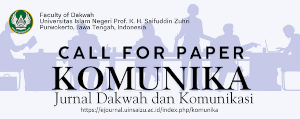Hubungan prokrastinasi Akademik dengan Aktualisasi Diri Mahasiswa Fakultas Dakwah IAIN Purwokerto
DOI:
https://doi.org/10.24090/komunika.v12i1.1355Keywords:
Academic Procrastination, Self-Actualization, Student, ActivistAbstract
This article aims to find out whether there is a relationship of academic procrastination with self-actualization of activist student of Faculty of Da’wah IAIN Purwokerto. The method in this research is quantitative method. This type of research belongs to field research which is correlation by using quantitative approach. Respondents in this study amounted to 28 students who became administrators of intra organizations such as Student Senate, Student Executive Board, Student Association Department and Student Association of Study Programs at Faculty of Da’wah. Sampling technique with random sampling technique. In collecting the data the researchers used questionnaires. While the data analysis method used consisted of data collection, validity and reliability test, item analysis, correlation test, hypothesis test and conclusion. Result of research from method which have been done obtained by coefficient coefficient equal to 0,176 which show very weak correlation. Then test the hypothesis with n = 28, 5% significance in obtaining r table of 0.374 and shows the value of r arithmetic <r table so that it can be concluded that there is no significant relationship between academic procrastination and self-actualization student activist da’wah faculty.Downloads
Download data is not yet available.
References
Alwisol, M. (2004). Psikologi kepribadian . Malang: Universitas Muhammyadiah Malang.
Annisa Rizki, S. (2009). Hubungan Prokrastinasi Akademis dan Kecurangan Akademis Pada Mahasiswa Fakultas Psikologi Universitas Sumatera Utara. Universitas Sumatera Utara.
Arikunto, S. (1992). Prosedur penelitian: Suatu pendekatan praktik. Jakarta: Rineka Cipta.
Chaplin, J. P., & Kartono, K. (1989). Kamus Lengkap Psikologi. Rajawali Pers.
Goble, F. G. (1987). Mazhab Ketiga, Psikologi Humanistik Abraham Maslow. Yogyakarta: Kanisius.
Hall, L. (1993). Teori-Teori Kepribadian. Jakarta: Rineka Cipta. Hartosujono. (2012). Perilaku Prokrastinasi Mahasiswa Ditinjau Dari Locus Of Control. Jurnal Spirits, 3(1). Retrieved from http://psikologi.ustjogja.ac.id/wp-content/uploads/2016/04/Perilaku-Prokrastinasi-Mahasiswa-Ditinjau-dari-LOC.pdf
Heliani. (2012). Pengaruh Sistem Pengendalian Manajemen Terhadap Kinerja Manajerial Dengan Gaya Kepemimpinan Sebagai Variabel Moderating. Universitas Pendidikan Indonesia.
Jaenudin, U. (2015). Teori- teori Kepribadian. Bandung: Pustaka Setia.
Jaya, S. R. L. (2016). Studi Deskriptif Kuantitatif Prokrastinasi Mahasiswa
Fakultas Psikologi Universitas Sanata Dharma. Universitas Sanata Dharma.
Kuntjojo, D. (2009). Metodologi Penelitian. Universitas Nusantara PGRI Kediri. Kediri.
Kurnia, T., & Shinta, A. (2015). Hubungan antara Kohesivitas Organisasi dengan Aktualisasi Diri pada Anggota Komunitas Pemuda Gereja. In Seminar Psikologi & Kemanusiaan.
Olson, M. H., & Hergenhahn, B.. (2013). Pengantar Teori- Teori Kepribadian. Yogyakarta: Pustaka Pelajar.
Putri, T. D. (2007). Kebutuhan Aktualisasi Diri pada Remaja Penyandang Tunanetra yang Bersekolah di Sekolah Umum Ditinjau dari Kematangan Emosi dan Self Disclosure. Surakarta: Universitas Muhammadiyah Surakarta.
Reza, I. F. (2014). Hubungan Antara Motivasi Akademik Dengan Prokrastinasi Akademik Pada Mahasiswa. HUMANITAS, 12(1), 39–44. Retrieved from http://journal.uad.ac.id/index.php/HUMANITAS/article/download/3827
Sia, T. (2006). Apakah Prokrastinasi Menurunkan Prestasi? Sebuah Meta- Analisis. ANIMA Indonesian Psychological Journal, 22(1), 17–27.
Soetanto, C. (2016). Aktualisasi Diri Wanita Karier yang Mengurus Rumah Tangga. Universitas Sanata Dharma.
Sugiyono. (2015). Metode Penelitian Kuantitatif, Kualitatif dan R & D. Bandung: Alfabeta.
Annisa Rizki, S. (2009). Hubungan Prokrastinasi Akademis dan Kecurangan Akademis Pada Mahasiswa Fakultas Psikologi Universitas Sumatera Utara. Universitas Sumatera Utara.
Arikunto, S. (1992). Prosedur penelitian: Suatu pendekatan praktik. Jakarta: Rineka Cipta.
Chaplin, J. P., & Kartono, K. (1989). Kamus Lengkap Psikologi. Rajawali Pers.
Goble, F. G. (1987). Mazhab Ketiga, Psikologi Humanistik Abraham Maslow. Yogyakarta: Kanisius.
Hall, L. (1993). Teori-Teori Kepribadian. Jakarta: Rineka Cipta. Hartosujono. (2012). Perilaku Prokrastinasi Mahasiswa Ditinjau Dari Locus Of Control. Jurnal Spirits, 3(1). Retrieved from http://psikologi.ustjogja.ac.id/wp-content/uploads/2016/04/Perilaku-Prokrastinasi-Mahasiswa-Ditinjau-dari-LOC.pdf
Heliani. (2012). Pengaruh Sistem Pengendalian Manajemen Terhadap Kinerja Manajerial Dengan Gaya Kepemimpinan Sebagai Variabel Moderating. Universitas Pendidikan Indonesia.
Jaenudin, U. (2015). Teori- teori Kepribadian. Bandung: Pustaka Setia.
Jaya, S. R. L. (2016). Studi Deskriptif Kuantitatif Prokrastinasi Mahasiswa
Fakultas Psikologi Universitas Sanata Dharma. Universitas Sanata Dharma.
Kuntjojo, D. (2009). Metodologi Penelitian. Universitas Nusantara PGRI Kediri. Kediri.
Kurnia, T., & Shinta, A. (2015). Hubungan antara Kohesivitas Organisasi dengan Aktualisasi Diri pada Anggota Komunitas Pemuda Gereja. In Seminar Psikologi & Kemanusiaan.
Olson, M. H., & Hergenhahn, B.. (2013). Pengantar Teori- Teori Kepribadian. Yogyakarta: Pustaka Pelajar.
Putri, T. D. (2007). Kebutuhan Aktualisasi Diri pada Remaja Penyandang Tunanetra yang Bersekolah di Sekolah Umum Ditinjau dari Kematangan Emosi dan Self Disclosure. Surakarta: Universitas Muhammadiyah Surakarta.
Reza, I. F. (2014). Hubungan Antara Motivasi Akademik Dengan Prokrastinasi Akademik Pada Mahasiswa. HUMANITAS, 12(1), 39–44. Retrieved from http://journal.uad.ac.id/index.php/HUMANITAS/article/download/3827
Sia, T. (2006). Apakah Prokrastinasi Menurunkan Prestasi? Sebuah Meta- Analisis. ANIMA Indonesian Psychological Journal, 22(1), 17–27.
Soetanto, C. (2016). Aktualisasi Diri Wanita Karier yang Mengurus Rumah Tangga. Universitas Sanata Dharma.
Sugiyono. (2015). Metode Penelitian Kuantitatif, Kualitatif dan R & D. Bandung: Alfabeta.
Downloads
Published
2018-06-30
Issue
Section
Articles
License
Authors who publish with this journal agree to the following terms:
- Authors retain copyright and grant the journal right of first publication with the work simultaneously licensed under a Creative Commons Attribution-ShareAlike 4.0 International License that allows others to share the work with an acknowledgement of the work's authorship and initial publication in this journal.
- Authors are able to enter into separate, additional contractual arrangements for the non-exclusive distribution of the journal's published version of the work (e.g., post it to an institutional repository or publish it in a book), with an acknowledgement of its initial publication in this journal.
- Authors are permitted and encouraged to post their work online (e.g., in institutional repositories or on their website) prior to and during the submission process, as it can lead to productive exchanges, as well as earlier and greater citation of published work (See The Effect of Open Access).

























